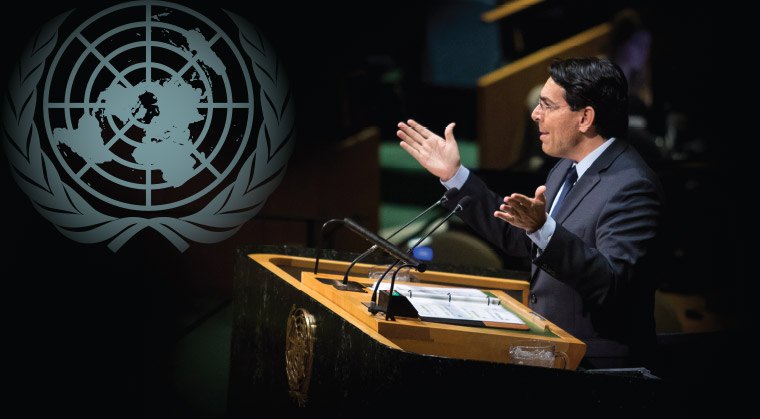Diplomatic Dance at the UN

A day spent with Israel’s ambassador to the United Nations, Danny Danon, reveals quiet work behind the scenes that nurtures the promise of a brighter tomorrow

Danon is first and foremost a political figure — and a provocative one at that — but he’s honed his diplomatic voice at this new posting (Photos Flash 90, Omri Nahmias)
T
he headquarters of the United Nations at East 42nd Street in Manhattan might be the most important address in the world.
Situated along the East River on 18 acres, it is a grand spectacle, with the flags of all 193 member nations fluttering out front in a show of unity and respect.
Within these walls, ambassadors from every nation gather to discuss war and peace, poverty and prosperity, the future of humanity — our hopes, our dreams.
But I feel decidedly ambivalent as I walk inside.
On the one hand, I can’t help but be impressed by the collection of diplomats in sharp suits being trailed by their zealous aides in the building’s winding corridors. Never have so many symbols of world power been concentrated in one place. On the other, the United Nations has become a prime example of international dysfunction, the place where military dictatorships and banana republics are given seats on the human rights council, and repressive Arab kingdoms are asked to chair meetings on women’s rights.
And then there’s Israel, the country that UN member states love to hate, the lone democracy in the Middle East that serves as a scapegoat for all of humanity’s woes.
But I didn’t come to the United Nations today to lecture its diplomats or refocus its agenda. I’m here to meet Israel’s ambassador to the institution, Danny Danon.
Art of the Possible Danon is first and foremost a political figure — and a provocative one at that — but he’s honed his diplomatic voice at this new posting. Smart, blunt, and very assertive, he once antagonized Prime Minister Binyamin Netanyahu so much (over the prime minister’s conduct of Operation Protective Edge in 2014) that he got himself fired from his deputy defense minister post. But as the saying goes, politics is the art of the possible. Just over a year later, Danon was back, this time appointed by none other than Netanyahu to represent Israel at the United Nations.
Once I pass through the obligatory security check, it takes me only about a minute to get lost. The United Nations headquarters is huge, an endless maze of corridors, dead ends, and “no entry” signs only a veteran employee can navigate. Thankfully, a spokesman for the Israeli delegation meets me at the entrance and leads the way effortlessly. I ask him how long he’s been working at the world body, and he says two years: long enough, apparently, to know which hallways he can enter and which he cannot.
I remember my days as a university student back in Israel, when I worked as a tour guide in the Knesset. At the time, I felt an enormous responsibility to acquaint myself with every corner of the building. Today that seems like child’s play; the Knesset’s square footage is dwarfed by a complex that stretches over six New York City blocks.
I’ve come to spend a few hours with Danon in his natural environment, if you can call it that — his place of employment for the last two and a half years. I want to see what he does, feel what he feels, witness the diplomatic dance in all its complexity.
(Excerpted from Mishpacha, Issue 704)
Oops! We could not locate your form.













